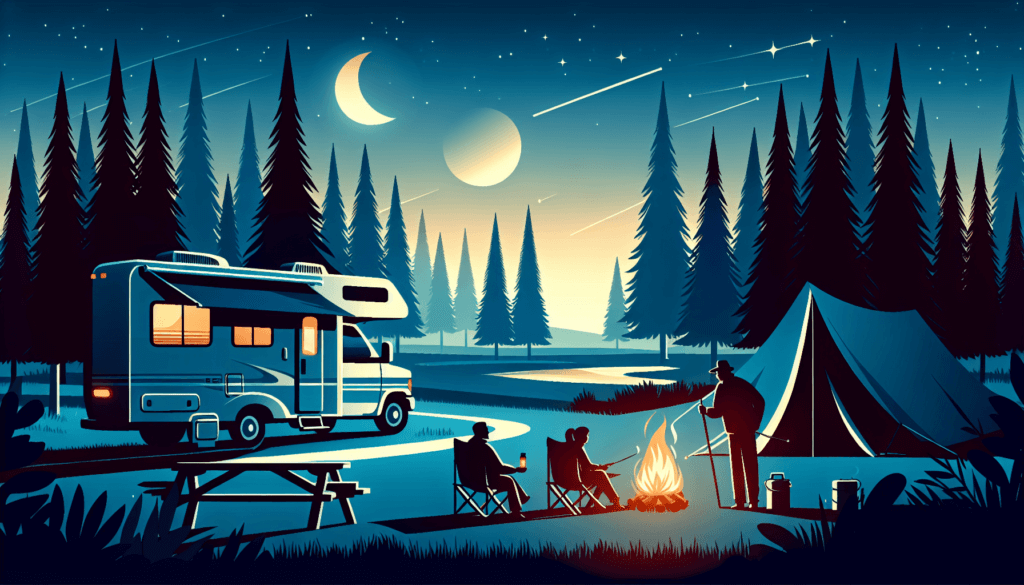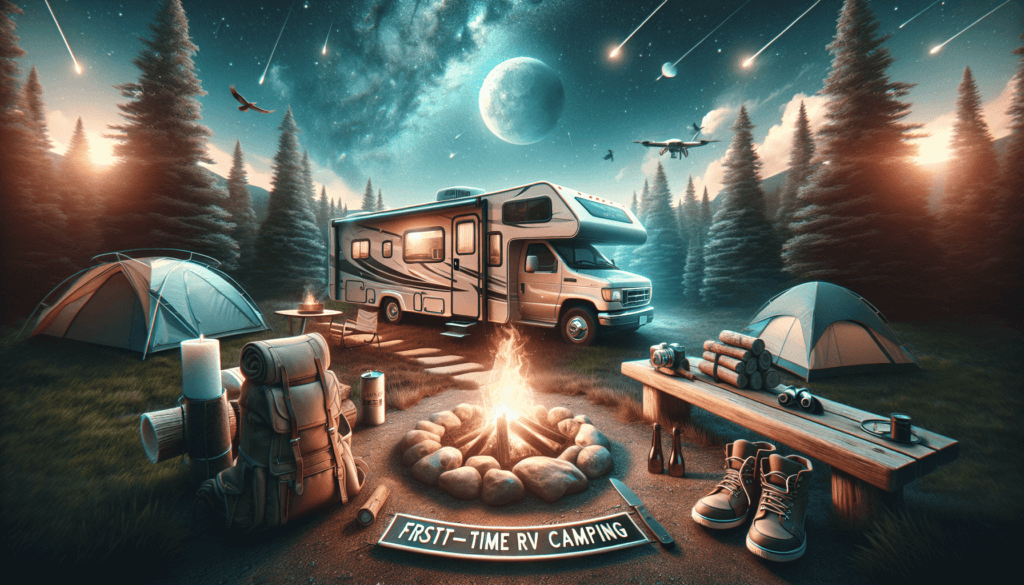So you’ve decided to embark on your first RV camping adventure, but where do you start? Don’t worry, this beginner’s guide is here to help you navigate the exciting world of RV camping. From tips on selecting the right RV for your needs to campground etiquette, we’ve got you covered. Get ready to hit the open road and create unforgettable memories as we provide you with everything you need to know to make your first-time RV camping experience a resounding success.
Choosing the Right RV
Determining your needs
When it comes to choosing the right RV, the first step is to determine your needs. Think about how many people will be traveling with you and consider their comfort and space requirements. Are you planning on taking short weekend trips or embarking on long cross-country adventures? Understanding your needs will help you decide on the size, layout, and features that are important for you and your travel companions.
Considering size and weight
Size and weight are crucial factors to consider when choosing an RV. It’s essential to have a good understanding of the maximum weight your vehicle can tow, as well as any length restrictions in campgrounds or national parks you plan to visit. Evaluate the available storage space in the RV and ensure it meets your requirements. Remember, the larger the RV, the more challenging it might be to maneuver and park.
Researching different types of RVs
There are various types of RVs available, each offering unique advantages and features. Take the time to research and understand the differences between motorhomes, travel trailers, fifth wheels, and camper vans. Consider factors such as fuel consumption, sleeping arrangements, kitchen amenities, and bathroom facilities. By exploring the options, you can find an RV that perfectly suits your needs and preferences.
Reading reviews and asking for recommendations
Before making a final decision, it’s always a good idea to read reviews from other RV owners. Online forums and communities dedicated to RV camping are a great source of information. You can find valuable insights into the pros and cons of different RV models, brands, and manufacturers. Additionally, don’t hesitate to ask friends, family, or experienced RV enthusiasts for recommendations. Their firsthand experiences can provide you with valuable guidance in making the right choice.
Planning Your Trip
Deciding on a destination
Choosing the right destination is an exciting part of RV camping. Consider what type of experience you are looking for – whether it’s a beachside retreat, a mountain adventure, or a tour of national parks. Research various destinations, look for attractions, amenities, and activities that align with your interests, and select a location that offers the perfect blend of adventure and relaxation for your trip.
Mapping out your route
Once you’ve decided on a destination, it’s time to map out your route. Utilize online mapping tools or GPS devices specifically designed for RV travel to plan your journey. Take note of any potential road restrictions, construction zones, or low clearance areas that might affect your route. By mapping out your journey in advance, you can optimize your travel time and ensure a smooth and enjoyable RV camping experience.
Finding and booking RV campsites
Finding suitable RV campsites is essential for a successful trip. Research campgrounds and RV parks in your chosen destination and make reservations well in advance, particularly during peak travel seasons. Many campsites offer different amenities such as hookups for water, electricity, and sewer, as well as recreational facilities like pools and playgrounds. Consider the location, availability, and amenities offered to select the campsite that best meets your needs and preferences.
Checking for any travel restrictions or permits
Before you hit the road, it’s essential to check for any travel restrictions or permits that may be required for your planned route. Certain areas, especially national parks, may have specific regulations or limited access for RVs. Make sure to research and understand any restrictions, permits, or fees that may apply to your journey. By doing so, you can avoid any surprises and ensure a hassle-free trip.

Packing Essentials
Clothing and personal items
When it comes to packing for your RV camping trip, start with essential items such as clothing and personal items. Pack appropriate clothing for the weather conditions you expect to encounter, including layers for variable temperatures. Don’t forget essentials like toiletries, medications, and personal hygiene products. It’s also a good idea to bring along some comfortable outdoor gear, such as hiking boots and rain jackets, as you’ll likely be spending a lot of time exploring nature.
Bedding and towels
Ensure you have comfortable bedding and towels for your RV trip. Consider the size of your RV’s beds and pack appropriate sheets, blankets, and pillows. If the RV doesn’t come with its own bedding, you may need to bring your own sleeping bags or air mattresses. Don’t forget to bring towels for showering and outdoor activities.
Kitchen supplies and utensils
One of the advantages of RV camping is the ability to prepare your own meals. Pack essential kitchen supplies such as pots, pans, utensils, and dishes. Don’t forget to bring necessities like cutting boards, knives, and can openers. Consider bringing along a basic set of spices and condiments to add flavor to your meals. Additionally, bring storage containers and zip-lock bags to store leftovers and snacks.
Outdoor gear and tools
If you plan on spending time enjoying outdoor activities such as hiking, biking, or fishing, make sure to pack the necessary gear and equipment. Bring hiking boots, fishing rods, bicycles, and any other equipment that will enhance your outdoor experience. It’s also a good idea to pack tools such as a tire inflator, jumper cables, and a basic tool kit for any minor repairs or maintenance that may be needed during your trip.
First aid kit and emergency supplies
Safety should always be a priority when traveling in an RV. Pack a well-stocked first aid kit that includes essentials such as bandages, antiseptics, pain relievers, and any necessary prescription medications. Additionally, consider bringing emergency supplies such as a flashlight, extra batteries, a portable phone charger, and a basic tool kit in case of unforeseen emergencies.
Preparing the RV
Checking and servicing the engine
Before hitting the road, it’s crucial to check and service the engine of your RV. Regular maintenance, including oil changes, filter replacements, and fluid checks, is essential to ensure a safe and smooth journey. If you’re not experienced in RV engine maintenance, it’s best to take your vehicle to a certified mechanic who can perform a thorough inspection and address any potential issues.
Inspecting tires, brakes, and lights
Safety on the road starts with properly functioning tires, brakes, and lights. Check the tire pressure, tread depth, and overall condition of each tire. Inspect the brake pads, rotors, and brake fluid level. Ensure that all lights, including headlights, taillights, turn signals, and brake lights, are working correctly. If you notice any issues or concerns during the inspection, it’s essential to address them before embarking on your trip.
Testing all RV systems and appliances
Your RV is equipped with various systems and appliances that contribute to your comfort while camping. Before your trip, test all the systems, including the plumbing, electrical, heating, and cooling systems. Ensure that your refrigerator, stove, oven, and any other appliances are fully functional. If any issues or malfunctions are discovered, consult your RV’s owner’s manual or seek professional assistance to resolve them.
Filling up with fuel and propane
Before hitting the road, make sure to fill up your RV with fuel and propane. Having a full tank of fuel ensures that you’re prepared for any unexpected detours or longer drives between fuel stops. Propane is essential for powering your RV’s stove, oven, water heater, and furnace. Make sure to check the propane levels and refill if necessary. It’s always better to have more than enough fuel and propane than to run out during your trip.
Stocking up on water and groceries
Stocking up on water and groceries is crucial for a comfortable RV camping experience. Ensure that your RV’s freshwater tank is filled and ready for use. If you’re uncertain about the availability or quality of water at your destination, consider using a water filtration system or packing a supply of bottled water. Additionally, stock up on groceries and non-perishable items that you’ll need during your trip. Plan your meals and snacks in advance to minimize the need for frequent grocery runs.

Driving and Maneuvering
Getting familiar with RV dimensions
Driving an RV is different from driving a regular car. Before hitting the road, get familiar with the dimensions of your RV, including its height, length, and width. This knowledge will help you gauge clearance in tight spots, such as underpasses or narrow roads. Take the time to measure your RV and familiarize yourself with its dimensions to avoid any unpleasant surprises during your journey.
Practicing driving and parking in open areas
If you’re new to driving an RV, it’s important to practice in open areas before venturing onto busy roads. Find a spacious parking lot or an empty field and practice driving, turning, and parking your RV. Get comfortable with the size and handling of the vehicle to build confidence in your driving skills. By practicing in a controlled environment, you can develop the necessary skills to maneuver your RV safely on the road.
Understanding weight distribution and height clearance
Weight distribution and height clearance are critical considerations when driving an RV. Ensure that the weight inside your RV is evenly distributed to maintain stability on the road. Consult your RV’s owner’s manual for information on weight limits and recommended loading techniques. Additionally, be mindful of the height clearance of your vehicle. Pay attention to signs indicating low bridges, tunnels, or other obstacles to avoid causing damage to your RV.
Taking extra precautions on the road
When driving your RV, it’s essential to take extra precautions on the road. Maintain a safe following distance, as RVs require more time and distance to come to a complete stop compared to regular vehicles. Avoid sudden maneuvers, and drive at a moderate speed that allows for better control and stability. Be aware of changing road conditions, weather conditions, and potential hazards on the road. Remember to check your mirrors frequently and use your turn signals to communicate your intentions to other drivers.
Using caution when reversing or turning
Reversing and turning an RV can be challenging, especially in tight or crowded areas. Always use caution and be mindful of your surroundings when reversing or making a turn. Take advantage of your RV’s rearview camera, if available, to assist you with backing up. If you’re uncertain about a particular maneuver, don’t hesitate to ask for assistance or guidance from a spotter outside the vehicle to ensure a safe and successful maneuver.
Setting Up at the Campsite
Leveling the RV
One of the first tasks when setting up at a campsite is to level your RV. Utilize leveling blocks or hydraulic leveling systems (if available) to ensure that your RV is stable and comfortable. A level RV provides a solid foundation for all other setup tasks and ensures that appliances, such as the refrigerator, work efficiently.
Connecting to utilities
Properly connecting to utilities is vital for your comfort during your RV camping trip. Ensure that you have access to electricity by plugging your RV into the campground’s power pedestal or using a generator. Connect your RV’s water hose to the campground’s water hookup to access a clean water supply. Finally, connect your RV’s sewer hose to the campground’s sewer connection to securely dispose of wastewater. Take care to follow campground rules and regulations regarding utility connections.
Deploying slide-outs and awnings
If your RV is equipped with slide-outs and awnings, deploy them carefully after your RV is leveled and connected to utilities. Slide-outs increase the living space in your RV, providing additional comfort and convenience. Follow the manufacturer’s instructions to ensure that the slide-outs are deployed and retracted safely and securely. Awning deployment requires caution as well, ensuring that it is correctly extended and properly secured to withstand wind and other weather conditions.
Securing the RV with stabilizer jacks
To stabilize your RV and minimize movement while parked, deploy stabilizer jacks if your vehicle is equipped with them. Stabilizer jacks provide additional support and prevent excessive rocking or swaying. Follow the manufacturer’s instructions to properly deploy and secure the jacks, taking care to level your RV before starting this process.
Organizing the interior for comfort
Once your RV is set up and stabilized, take the time to organize the interior for comfort and convenience. Utilize storage compartments, cabinets, and overhead bins to store your belongings efficiently. Create designated areas for kitchen supplies, toiletries, and clothing, making it easier to find what you need during your trip. Invest in collapsible storage containers, hangers, and drawer dividers to maximize space and keep items securely in place while on the move.

Campsite Etiquette and Safety
Respecting quiet hours and surroundings
Respecting quiet hours and your campground neighbors is an important aspect of RV camping etiquette. Be mindful of noise levels, especially during designated quiet hours, typically in the evening and early morning. Keep music, TV, and conversation volumes at a considerate level to create a peaceful environment for everyone. Additionally, respect the natural surroundings of the campsite by not littering, keeping pets on a leash, and adhering to any campground rules regarding wildlife encounters.
Properly disposing of waste and garbage
Proper waste disposal is essential for maintaining a clean and sanitary campsite. Dispose of all garbage in designated bins and follow campground guidelines for recycling. When it comes to blackwater and greywater disposal, ensure that you’re using appropriate dump stations or facilities to empty your RV’s holding tanks. Follow all instructions for handling sewage and wastewater to protect the environment and uphold campground hygiene standards.
Following campground rules and regulations
Each campground has its own set of rules and regulations to ensure the safety and enjoyment of all guests. Take the time to familiarize yourself with these rules upon arrival. Respect speed limits, parking restrictions, and campsite boundaries. Adhere to any fire regulations, including firewood restrictions and the use of designated fire pits. By following the campground rules, you contribute to a harmonious camping experience for all.
Securing your belongings and valuables
While RV camping provides a sense of security, it’s still important to take precautions to protect your belongings and valuables. Lock your RV when you’re away or sleeping, and consider using additional deterrents like window and door alarms. Avoid leaving valuable items, such as electronics or jewelry, in plain sight. When exploring the outdoors or leaving your campsite for an extended period, secure your belongings inside locked compartments or use a portable safe if available.
Being mindful of fire safety and wildlife encounters
Fire safety is a crucial consideration when camping. Always follow campground rules and regulations regarding campfires and fire safety. Make sure you have a fire extinguisher readily available and know how to use it. Never leave a campfire unattended and ensure that it is completely extinguished before leaving. Additionally, be mindful of wildlife encounters by properly storing food and disposing of waste in wildlife-proof containers. Respect the natural habitat and avoid feeding or approaching wild animals.
RV Maintenance and Troubleshooting
Regular cleaning and upkeep
Regular cleaning and upkeep of your RV are essential to keep it in top condition. Clean the interior regularly, including floors, countertops, and appliances. Check for signs of mold or mildew and address any issues promptly. Clean and maintain the exterior, paying special attention to seals, joints, and the roof to prevent leaks and water damage. Regularly wash the RV and keep it free from dirt and debris that can impact its appearance and longevity.
Monitoring fluid levels and tire pressure
Monitoring fluid levels and tire pressure is necessary to ensure your RV operates optimally and safely. Check the engine oil, transmission fluid, coolant levels, and brake fluid regularly, topping up or changing fluids as needed. Don’t forget to check the windshield wiper fluid and power steering fluid as well. Additionally, check the tire pressure frequently, ensuring that each tire is properly inflated according to the manufacturer’s recommendations. Regular maintenance and monitoring can help prevent breakdowns and improve fuel efficiency.
Dealing with common RV issues on the road
While on the road, you may encounter common RV issues that require troubleshooting. Be prepared by familiarizing yourself with the owner’s manual and learning common troubleshooting techniques. Keep essential tools and spare parts on board, such as fuses, light bulbs, and extra hoses. Common issues include electrical problems, leaking pipes, malfunctioning appliances, and flat tires. By having the necessary knowledge and resources, you can address these issues quickly and get back on the road.
Finding reliable repair services or DIY resources
In situations where you encounter RV issues beyond your ability to repair, it’s crucial to have reliable repair services available. Research and compile a list of reputable RV repair shops and service centers along your planned route. Additionally, explore online resources, forums, and how-to guides that provide step-by-step instructions for common RV repairs. Building your knowledge and network of resources will help you navigate unexpected situations and ensure a smooth RV camping experience.

Exploring the Outdoors
Hiking, biking, and nature walks
One of the greatest joys of RV camping is exploring the outdoors and connecting with nature. Take advantage of the natural surroundings at your campsite by going for hikes, bike rides, or leisurely walks. Research nearby trails, nature reserves, or scenic areas where you can immerse yourself in the beauty of your surroundings. Remember to pack appropriate gear such as sturdy hiking shoes, helmets for biking, and a backpack for carrying essentials like water and snacks.
Fishing, boating, and water activities
If you’re camping near a body of water, seize the opportunity to enjoy fishing, boating, or water activities. Research local fishing regulations and obtain the necessary permits or licenses. Bring along the appropriate fishing gear and bait to try your luck at catching fresh fish for dinner. If boating is allowed in the area, bring your kayak, canoe, or paddleboard for a fun-filled day on the water.
Photography and wildlife observation
RV camping offers excellent opportunities for photography and wildlife observation. Keep your camera or smartphone handy to capture memorable moments and stunning landscapes. Practice patience and silence to enhance your chances of spotting wildlife. Remember to keep a respectful distance from animals and never feed or disturb them. By observing wildlife from a distance, you contribute to their well-being and preservation.
Visiting nearby attractions and landmarks
Your RV camping trip may present opportunities to visit nearby attractions and landmarks. Research local points of interest, historical sites, or iconic landmarks that are within driving distance from your campsite. Plan day trips or excursions to explore these attractions and immerse yourself in the local culture and history. Visiting nearby attractions adds an extra layer of adventure and discovery to your RV camping experience.
Enjoying campfire cooking and stargazing
One of the highlights of RV camping is the cozy and communal experience of campfire cooking and stargazing. Gather around the campfire and prepare delicious meals using a portable grill or a cast-iron skillet. Roast marshmallows for s’mores or cook foil-wrapped packets of veggies and meats for a tasty outdoor feast. Once the sun sets, take advantage of the clear skies and minimal light pollution to engage in stargazing. Identify constellations, watch for shooting stars, and marvel at the wonders of the universe.
Building RV Camping Skills
Learning to back up and park with precision
Backing up and parking an RV can be challenging, but with practice, you can build the necessary skills. Take the time to practice backing up in open areas such as empty parking lots or fields. Use cones or markers to simulate tight parking situations and practice maneuvering around them. Develop an understanding of the pivot point and turning radius of your RV to confidently park it in various environments.
Mastering electrical and water hookups
Understanding how to properly connect your RV to electrical and water hookups is a valuable skill for any RV camper. Review the manufacturer’s instructions for your specific RV model to learn the correct procedures. Practice connecting and disconnecting utilities in a low-pressure environment, such as at home or in a campground with full hookups. By mastering these skills, you’ll be able to quickly and efficiently set up camp at any destination.
Understanding RV weight limits and towing capacity
Educating yourself on RV weight limits and towing capacity is essential for safe and efficient travel. Know the weight limits of your RV, including the Gross Vehicle Weight Rating (GVWR) and Gross Combined Weight Rating (GCWR). Be aware of how these limits may affect your ability to carry additional cargo or tow a vehicle. Understanding these limits will help you make informed decisions about what to bring and how much weight you can safely carry or tow.
Becoming efficient in setting up and taking down camp
Efficiency in setting up and taking down camp is a valuable skill to develop as an RV camper. Create a checklist to ensure that you don’t miss any important steps during setup or takedown. Practice the process repeatedly to streamline your routine and become more efficient with each trip. By becoming proficient in camp setup and takedown, you’ll spend less time on these tasks and have more time to enjoy your camping experience.
Developing navigation and trip planning skills
Navigation and trip planning skills are crucial for a successful RV camping journey. Familiarize yourself with mapping tools, GPS devices, or smartphone apps that are specifically designed for RV travel. Learn how to plan routes that consider factors such as RV restrictions, road conditions, and camping preferences. This skill will enable you to maximize your time on the road and reach your destinations safely and efficiently.
With this comprehensive guide, you are now equipped with the knowledge and tips to embark on your first RV camping adventure. From choosing the right RV to mastering essential camping skills, you’re ready to create unforgettable memories on the open road. Remember to plan ahead, stay organized, and embrace the unpredictable nature of RV camping. Enjoy the journey, explore the outdoors, and make the most of your RV camping experience!



